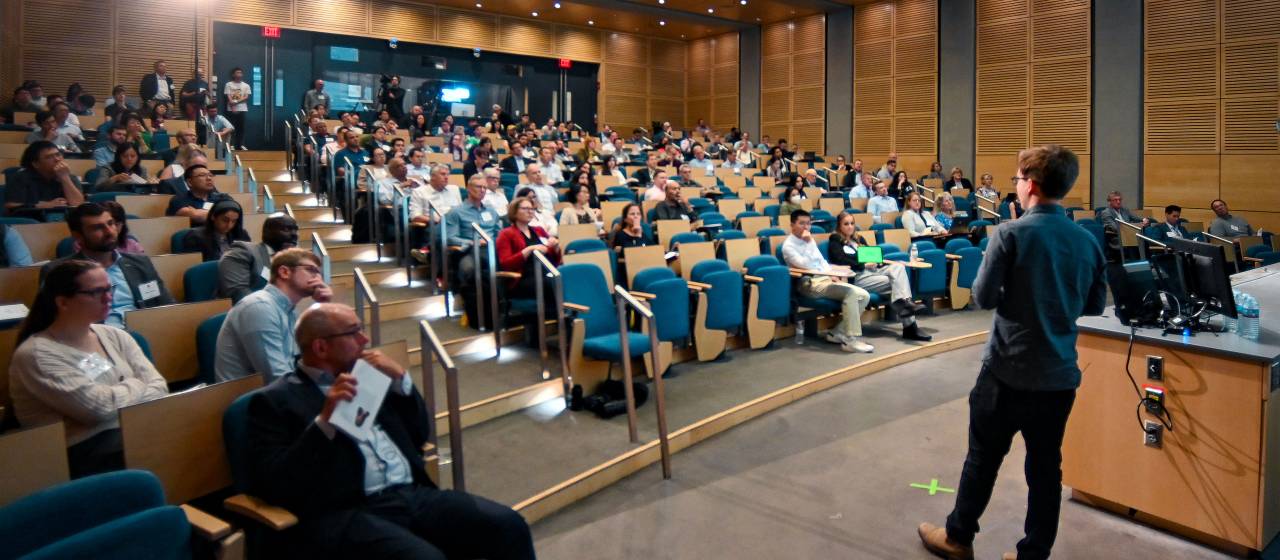PCI symposium assembles cutting-edge researchers to spark innovation
The Princeton Catalysis Initiative (PCI) hosted its sixth annual symposium this year, with research flash talks that drew Princeton faculty from a variety of fields as presenters and audience members, and attracted industry attention.
The annual symposium challenges speakers to tell their best research stories in under eight minutes, spotlighting blue-sky ideas to catalyze fresh collaborations.
This year’s presenters included faculty in sociology, music and Princeton’s School of Public and International Affairs, along with representatives from disciplines that have been a part of PCI since its inception: computer science, molecular biology, engineering, chemistry and genomics.
Catalysis beyond chemistry
In 2017, David MacMillan, the James S. McDonnell Distinguished University Professor of Chemistry, and several colleagues founded PCI as a way to catalyze new research partnerships on campus and with industry. Today, 500 collaborations across 12 departments are backed by $100 million in committed funding.
“The idea was, if you think of all the cutting-edge research going on in all these departments and you could connect them at the intersections, could you create new research fields?” MacMillan said in his opening remarks at this year’s event, held at the end of the academic year in Frick Laboratory. “And could you do that not just once, but as a routine mechanism?
“That’s what we call catalysis beyond chemistry. That’s why we’re here today.”
Faculty presenters laid out their work in four sessions, with topics ranging from quantum engineering to human-centered decarbonization strategies to the regulation of microbial proteins across the day-night cycle. Afterwards, they fielded questions from peers and representatives of PCI’s six industry partners.
'So nascent, so cutting edge'
“The research is always so nascent, so cutting edge, and they link it in such a way that you can make the next jump,” said Callie Bryan, scientific director at Janssen/Johnson & Johnson, who has attended PCI symposia for several years.
“You’re listening to fascinating researchers all day,” she said. “When they jump from topic to topic and they riff on each other, you get all of these ideas. Put them together, and that’s when you get the lightbulbs.”
Lydia Lynch, professor of molecular biology and the Ludwig Princeton Branch, was attending and presenting for the first time. “For me, being new, this was a great way to get a snapshot of the exciting work going on in Princeton,” she said. “I have seen flash talks before, but these were different. I learned so much.”
Wide-ranging discussing afterwards connected colleagues from across the University. “I had a talk with a climate scientist who asked an immunology question,” Lynch said.
This year’s presenters included:
- Elizabeth Margulis, professor of music and director of graduate studies in musicology, who talked about her research investigating music and daydreams as precursors to insight.
- Michael Skinnider, assistant professor of the Lewis-Sigler Institute for Integrative Genomics and Ludwig Princeton Branch, who spoke about illuminating unknown “chemical dark matter” in small molecules through new computational tools.
- Janet Vertesis, associate professor of sociology, who presented on the research impact of science team organization.
- Parastoo Abtahi, assistant professor of computer science, who outlined her research bringing a “sense of touch” to virtual reality.
The full collection of 2024 flash talks is archived on the PCI website for faculty, staff, and students using their Princeton Net ID.
The Princeton Catalysis Initiative acknowledges generous support from Anthony Evnin ’62 and Eric ’76 and Wendy Schmidt through the Schmidt DataX Fund.



